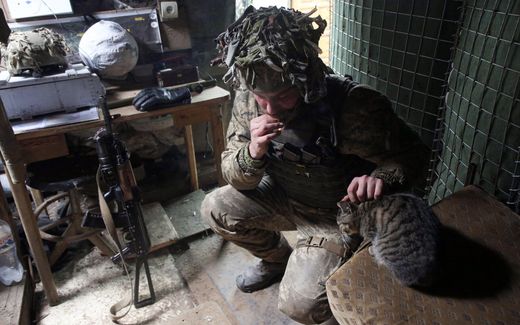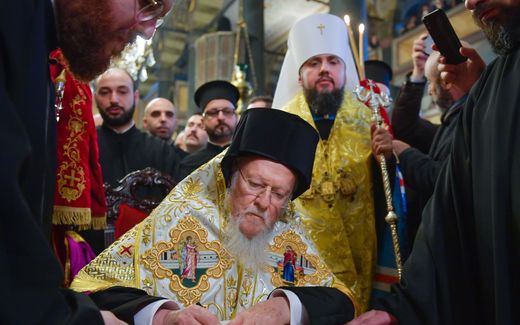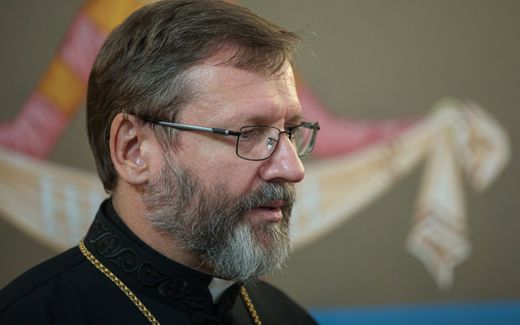Ukrainian churches gather amidst the violence of war
28-02-2022
Eastern Europe
L. Vogelaar, RD
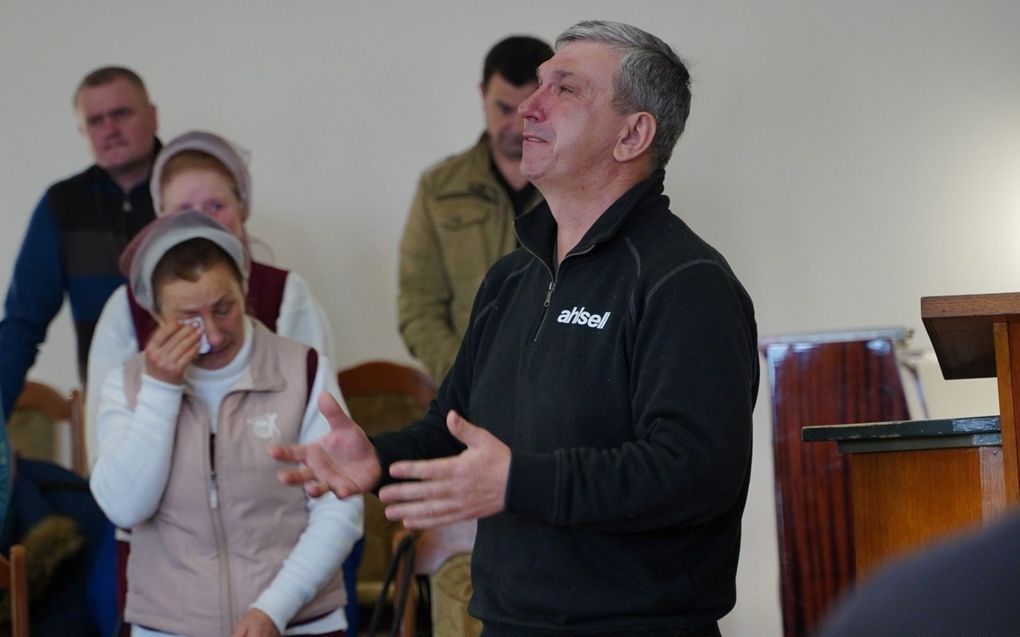
Emotions during a sermon in in Strumok, southern Ukraine. Photo KOEH
Eastern Europe
On Sunday, in sermons and prayer meetings, Ukrainian churches reflected on the difficult situations the people have found themselves in due to the Russian invasion.
The Dutch Pieter van Dijke, followed online the services of the Baptist congregation to which he and his family belong. He lives on the edge of a large military training ground near the city of Zhytomyr. “It is now calm and quiet here, but everyone stays at home as much as possible”, he said on Monday morning. During the services, attention was paid to the war.
Gerben Heldoorn, director of the Dutch development organisation ‘Kom Over en Help’ (Come over and help us), contacted three Ukrainian congregations on Sunday. “People visit each othergathered as much as possible, often in the basement of the church. They prayed, cried, and encouraged each other through Bible verses. I heard from a congregation in the west that families gathered in groups at home. The congregation of Strumok, in the south, did have a service in the church. You can see the emotions in the photos we received.”
On the run
Lena Voth reported from Zhytomyr to the Dutch Mir Wam Foundation, which provides practical assistance in Ukraine, that members of her church have brought food and literature to Ukrainian soldiers. Last night, because there were two alarms, she was in the church’s basement. Her neighbours were also invited to come there.

The congregation in Zhytomyr, served by Rev. D. M. Vinogradsky, has received fifty people in the school next to the church, including thirty orphans, says Katya, the pastor’s daughter. She lives in the Netherlands. “They stay in the basement, but when it is quiet, they eat in the gym. They prayed together in the school hall. The members of the congregation also meet in the houses. The advice is not to go out on the street.”
Rev. Vinogradsky wanted to stay in Zhytomyr, but at the insistence of his children, he left anyway. “With a large part of my family”, says his daughter. “On Thursday evening, they prayed together at my father’s house. Then, they started driving. They later learned that men between 18 and 60 are not allowed to leave Ukraine because they have to help protect the country. The group then decided not to separate the family members. Therefore, the men who had to remain in the country went back with their families. Only my father and the unmarried sister who lives with him, another sister with her children, and my pregnant niece carried on. The ten of them arrived in Romania on Saturday evening. There, they were warmly received by local Christians. A car had to be repaired, but they are now on their way to the Netherlands. That is not without danger, because it is snowing.”
Cor Ploeg – Katya’s husband–, their two sons and two others – a fellow student of one of their sons, and Karst de Vries, former director of Kom Over en Help– went out to get them. “They had to talk to my sisters because they were in shock. They wanted to go back: make soup for the soldiers and help where they could. But two women alone can’t go back, and the roads are blocked to stop the Russians. There is also plenty of help. My husband said: You can go to work there later if that is possible again.”
Soup kitchens
Rev. A. Margulis, a Jewish-Christian pastor in Zhytomyr, sent a video message on Friday evening in which he thanks for the sympathy and prayer. He indicated that he wanted to continue to serve as long as possible. The soup kitchens he manages are open, except in places conquered by or surrounded to by the Russians. “The shops are almost empty; I got several calls today from people asking for food.”
According to Rev. Margulis, the Ukrainian people perceive the Russian attack as a great injustice. “A foreign army is bombing our cities and killing our people. Many of my friends have spent the night in a bomb shelter.” No congregation members were injured or killed, the pastor said on Friday evening.
Monday afternoon Rev. Margulis sent his next message: “Everything was calm in Zhytomyr until yesterday... In the evening, an air raid began. We were told that they were coming at us from the side of Belarus, and the Zhytomyr region is on the border. Yesterday the Zhytomyr airport was attacked. We heard several loud explosions. People spent the whole night sitting in bomb shelters. But our troops hold the defense of the city. For our part, we try to help our army in any way we can. The rest of the people are praying and we ask you to pray too.”
Arno Kortleven, a Dutchman who works as a translator for a Christian missionary organisation, has fled the country with his wife and four children. “But we are always in touch with our friends there. Our congregation has been able to hold services. Not everyone was able to be there: there were rockets fired towards us on Sunday evening, there are roadblocks, and there is a curfew.”
Shortly before Kortleven set out with his family on Thursday morning, he emailed a map showing that there were locations on either side of his house at some distance where rockets had hit. He saw the smoke rise. Because of his wife and children, he decided to leave. “We started driving at ten in the morning and were at the Polish border at ten-thirty in the evening. We stood in line there for three days. Now and then, we moved a bit. We tried to get some sleep, but kept waking up when something happened.”
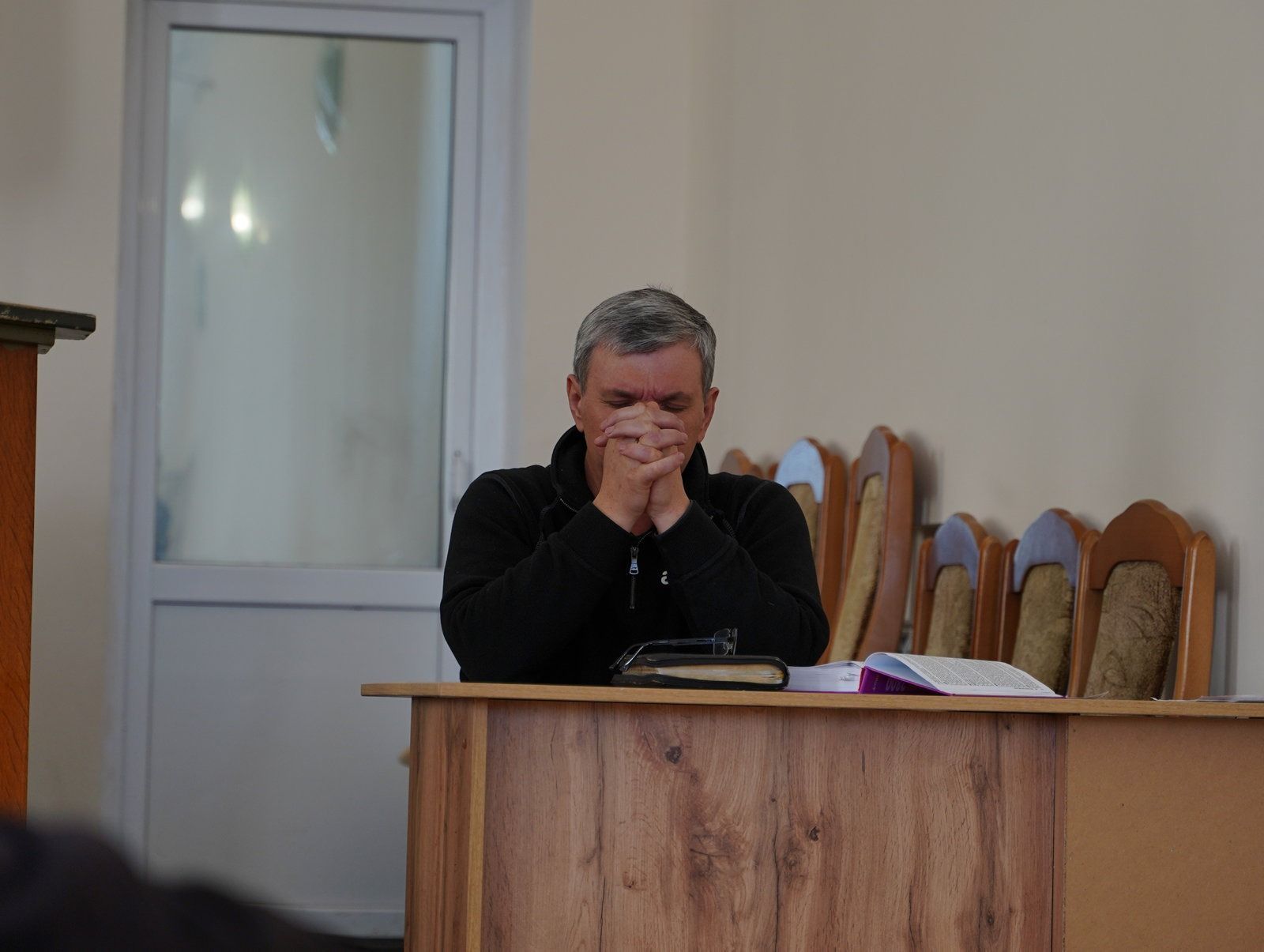
At the border, there were riots and children got trapped in the crowd. “Thousands of people tried to cross the border. There were also many foreigners: in Ukraine, there are many students from Africa and Asia. While we were in line, we were well served. People brought food, and we got text messages from the Polish government offering free help and shelter. However, we had an address where we could stay. Eleven of us spent the night there, because we are travelling with two other families,” said Kortleven on Monday morning when he was about to start driving again. “We hope to arrive at my parents’ place in the Netherlands late on Monday evening.”
Is Kortleven relieved to have left Ukraine? “We are because we finally got through at the border. However, not because we felt unsafe while waiting in line, because it wasn’t. And we have mixed feelings about what we hear from those who stayed behind. You would prefer to help them.”
Duty
Rev. Ivan Bespalov of an Evangelical Presbyterian congregation in Kyiv decided not to leave the city. “I feel that my people need me here.” Rev. Dimitri Zigankov in the Eastern Ukrainian city of Krasnopillya also emailed that he will remain at his post. “He was able to hold church on Sunday. About half of the members dared to come,” reports J. Huige of the Mir Wam Foundation. “The Russians have conquered that area. It is quiet there now.”
Huige had contact with several other congregations on Monday morning. “A congregation 30 kilometres south of Kharkiv, 10 kilometres from the front line, had a full church on Sunday twice. The men from this community do not take up arms themselves, but help the soldiers where they can. Hardly anyone wants to flee. A congregation in the Lower Carpathians, in the west, is preparing to receive refugees.”
Pavel Unguryan, an evangelical politician, involved in Ukraine’s National Prayer Breakfasts, said Friday that his family is in safety “while I do my duty in serving my country.”
This article was translated by CNE.news and previously published in Dutch daily Reformatorisch Dagblad on February 28th, 2022.
Related Articles


